Meeting the in-laws is a situation fraught with anxiety. Especially if you’re only meeting them for the first time at you wedding. And if you’re a lower-class former foster kid whose fiancée belongs to a family of super-rich board game tycoons. And if that family has a weird tradition of playing a game whenever someone new joins the family. And if the game you have to play is a twist on “Hide and Seek” that ends in the hider (read: you) being sacrificed so your new family can hold onto their obscene wealth.
Daniel (Adam Brody), black sheep of the 1%er Le Domas family, says it best: “The rich really are different.”
Ready or Not is the sophomore feature of Matt Bettinelli-Olpin and Tyler Gillett, who—as part of the filmmaking collective Radio Silence—contributed shorts to horror anthologies V/H/S/ (“10/31/98”) and Southbound (“The Way In”, “The Way Out”). With the support of Fox Searchlight and bolstered by excellent performances from star Samara Weaving (Mayhem, The Babysitter), Brody, Mark O’Brien as the fiancée, and Andie MacDowell as the Le Domas family matriarch, Ready or Not emerges as a gory, funny ride perfect as a late summer crowd pleaser.
Ready or Not is in theaters now. Boxoffice Pro spoke with Bettinelli-Olpin and Gillett shortly after a preview screening at Montreal’s Fantasia International Film Festival. This interview has been edited for length.
How was your Fantasia screening? I was bummed that I didn’t get to see it there with a crowd.
Tyler Gillett: It was incredible. We’d never had a movie play at Fantasia, and we’ve been told by so many people that it’s one of the best screening experiences you can have. And it definitely did not disappoint.
Samara Weaving is amazing in this movie. How did you come to cast her?
Matt Bettinelli-Olpin: Samara was somebody who we were peripherally familiar with. We’d obviously seen her movies and were huge fans of hers. She was someone that Searchlight has really been behind for a while. She was in Three Billboards [Outside Ebbing, Missouri]. They pitched her to us, and it was a very easy choice. We chatted with her via Skype. She was in Germany shooting something, and then we met up with her when she was back in LA for a bit. It just totally clicked. She loved the weird tone and the weird, dark humor of the script. We’d seen her do incredible work in action sequences from her previous films. It just was a match made in heaven.
Mayhem also blended action, horror, and comedy. She was great in that.
MBO: She simultaneously has a real vulnerability and a real strength, and that was really attractive to us for the role.
It feel like a weird thing to compliment, but she has a great horror movie scream in this. It’s angry but also terrified. It’s just blood-curdling.
MBO: Yeah. And she does a lot of it!
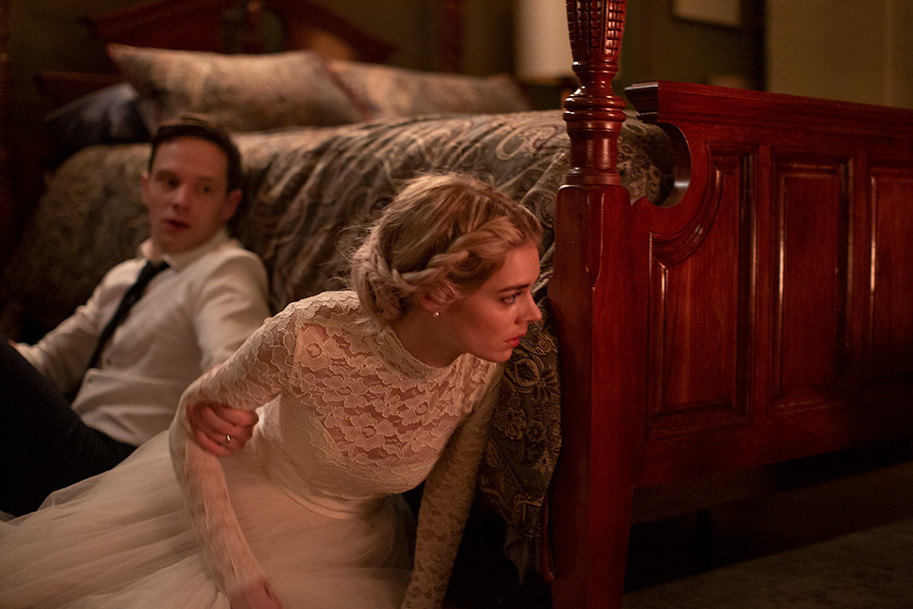
Most of this movie takes place either in a forest or in this gigantic mansion. Where did you shoot?
TG: We pieced it together from three locations. There’s Casa Loma in Toronto and then Parkwood Estate in Oshawa, which is an hour outside of Toronto. It’s where Billy Madison was shot. That’s where a lot of the rooms are. And then there’s the YWCA in Oshawa that we used as well, which was designed by the same architect that did Parkwood Estate. So they kind of had a similar vibe, but our production designer and his team, Andrew Stearn, really pieced it together for us in a fantastic way.
One of the crazy crazy parts of shooting this on location instead of doing builds was the weird math, the geography of the house that we were doing in our head in pre-production. Our production designer printed out blueprint, a schematic of the floors of the two larger estates that we shot in. We’re trying to make sense of, ‘Oh, you go left out of this hallway, and you’re in that other location. And how does it make sense that it hallway goes this way instead of this way?” It was a very weird, very weird exercise to try to figure out how to piece everything together.
MBO: The prints can be seen in the movie, by the way. They are on the wall in the control room. We put them up for fun.
I’m thinking of the people trying to puzzle out the geography of the Overlook Hotel in The Shining.
TG: Room 237! We have to kind of own that a little bit. It has to feel a little bit discombobulating.
You can just say that, if something doesn’t make sense, it’s because you’re a filmmaking genius.
TG: Any problems with the movie are intentional and there were totally by design.
How did you guys like come to come to be attached to the script?
TG: This was a script that actually came to us quite a few years ago. Two writers, Guy Busick and Ryan Christopher Murphy, wrote a draft that Tripp Vinson and Jamie Vanderbilt, the two producers, immediately fell in love with. They’d been trying to get it made for a few years before we finally came on board. And then we had one meeting with Tripp and Jamie. We obviously loved the script, but I think in addition to that, we just really love Tripp and Jamie. And then we met the writers. We just really hit it off with them.
Making any project is a bit of a marathon, and you have to really love the people that you’re in the process with. We just really clicked with everybody, and of course we absolutely loved the material. And so we developed it with them for a little while, and then pitched it around to various studios. And when Searchlight got involved, we continued to develop it with them. For as long as it took to get made, we think that because everybody has had the same target in mind, and they loved the project for the same reason, every time that we dove back into the script and did more work on it, it just got better and better. When it was finally time to go, I think it was like, “Oh shit, we really have something that we can shoot. We really have something that we believe in.” And we all really know it so well that it made it really fun. Nobody had different visions for the project other than what it ultimately ultimately was, which made the process really, really fun and rewarding.
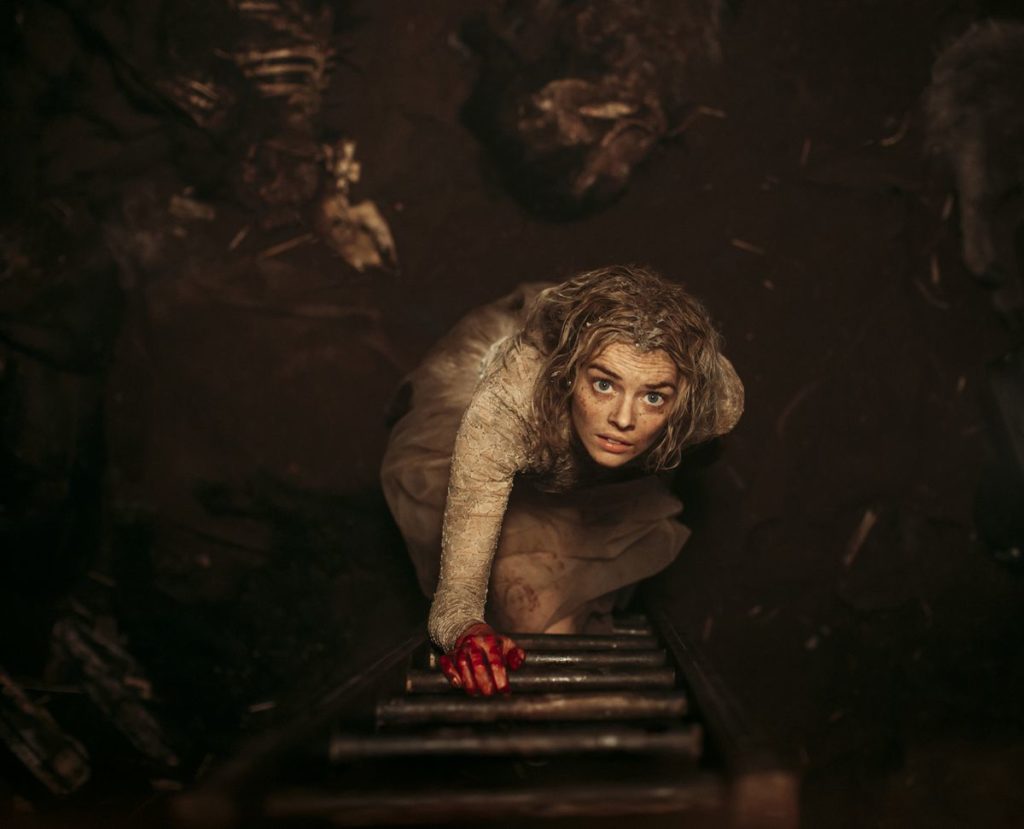
It’s awesome that Fox Searchlight got involved and is giving this movie a theatrical release. A lot of great horror goes straight to streaming.
MBO: For us, horror is best enjoyed in a communal setting. The theater experience for horror is pretty much unlike anything else. And that’s why we love it. It’s why we love making it. Fantasia, this weekend, was the perfect example of that. All the emotions are heightened when you’re sharing them with other people.
The great thing about streaming horror is that it gives a lot of new voices great opportunities, and that’s fantastic. And it’s getting more stories told, and that that’s always a wonderful thing. As long as we’re not losing theatrical [distribution], I think having two different kind of roads for is totally cool.
We do love that Searchlight got behind this, though. We couldn’t agree with you more on that. They championed it from the first script stage. They were so passionate about getting it to the screen and doing it in a way to maintain the unique tone and the fun and the darkness colliding in a way that you don’t always get to see theatrically. It was just really great. We hope people get to see it in the theater.
TG: But it’s still good at home! You know? There’s something about the way Searchlight approaches their product—there’s a bit of a fearlessness in it. They always wanted to do the weirdest thing, which is sort of counterintuitive, right? You think that at a studio it’s about making something accessible to as many people as possible. And they were always most intrigued by and most interested in the weirdest possible idea. And that was a super, super fun place to work from.
MBO: We can’t stress enough how excited we are that this is going to get a theatrical theatrical release with Searchlight behind it. Such an amazing opportunity.
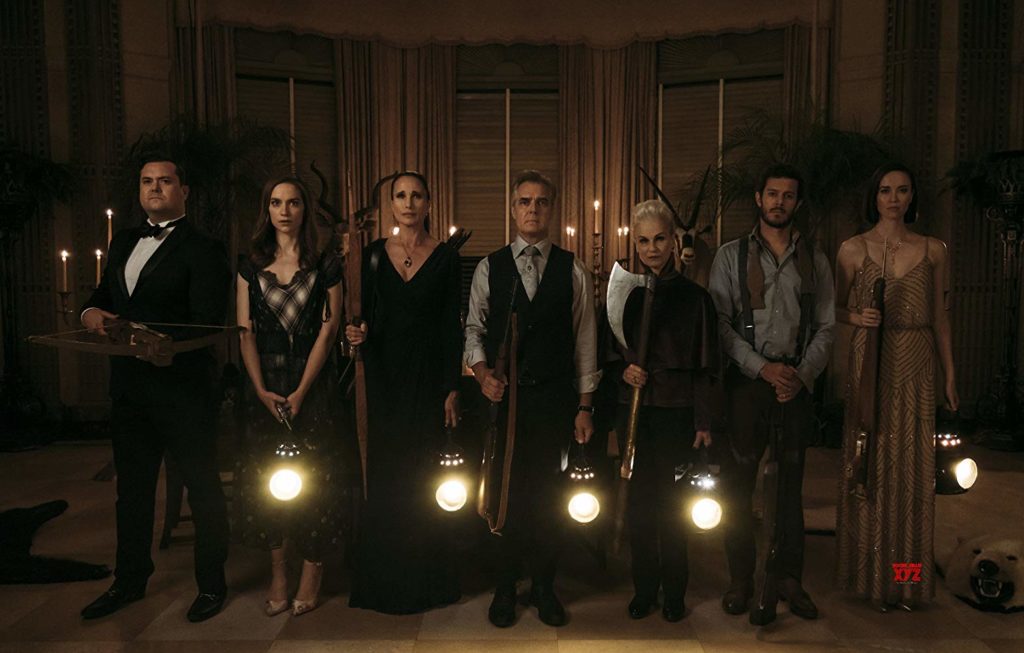
You said everyone was always on the same page about what this movie would become—but did that final vision change at all from what it originally was going to be?
MBO: This movie in particular was a long development process. I think Searchlight got on board the day after Trump was elected. November, 2016. And then we were shooting October 2018. Two solid years of development with Searchlight alone, not including the time we spent with the producers and writers before that, and the time the writers and producers spent before that without us onboard. So it was a long process.
But the short version is, once Searchlight got onboard, it really got refined down to the—least in our opinion—the best elements of what it is at its core. It was originally spread out over a longer period. It wasn’t a wedding. But the tone was there and the characters were there from day one, from before we were involved. Tone and characters were huge, and the bigger concept. And then once we got in with Searchlight, it became one night. It became the wedding. It became her marrying in as opposed to just meeting the parents. It was really great working with not only the studio, but producers and writers, Tripp and Jamie and Guy and Ryan throughout those two years to keep chipping away at it. Those guys did so many drafts, and each one got better, in our opinion. It really allowed us to get on-set with this great blueprint.
Do what do you want to do now? Jump into another years-long development process, make something quick like you did with your V/H/S and Southbound shorts?
MBO: We’re philosophically wrestling with what to do next. Not in terms of necessarily what we want to do, but certainly this process was so great. And the people that we worked with we really loved so much. It was like going to summer camp for two and a half years. So it’s hard to be in at that stage where you’re looking at the next block of marble and trying to figure out what to carve it into. But I will say, one of the things that this project has really done, I think collectively for all of us, is it’s really helped us set our compasses very specifically on the kind of movies we want to make.
In a lot of ways, Ready or Not is a return to the stuff that we were making when we all first started working together. These are these big, fun, entertaining, genre mash-ups. Ready or Not is the culmination of all of that for us. While it feels like such a huge step forward—it’s this big original idea with Searchlight behind it—it also feels like this comfortable homecoming, in a way. And I think that’s really valuable for us to realize like, “Oh shit, these are the kind of fun stories that we want to tell. And they can be meaningful, and they can have a ton of character and emotional and dramatic significance, but they can also just be a really crazy, fun ride.” A crowd pleaser. That’s what we want to go and see in theaters. And that’s the kind of stuff that we want to make. So right now it’s really just finding the next thing that excites us or writing the next thing that excites us and hopefully borrowing the best parts of what this last process was along along with us.
You’ve tackled the old dark house trope, sort of, with Ready or Not. Is there some other type of horror movie that you’d like to put your stamp on next?
MBO: It’s funny you say “old dark house.” Since our earliest days working together, we’ve let location inform us in a big way. You think of our V/H/S piece, it’s like a haunted house. And then Soutbound is bright, bright desert. And with this, it’s like the dark, creepy old house. We’ve talked a lot about outdoorsy stuff. It might be kind of cliche at this point. I know we had a script once that was that that we loved, but we never shot it. What else, Tyler?
TG: We’ve always wanted to make a weird body horror project. It’s hard to talk really specifically about a sub-genre we want to tackle, because our love has always been to make you feel like you’re watching something really specific and really archetypical in terms of its genre or its tropes, and then completely flip that around. Or then to collide that with a totally different tone or a totally different genre. That, for us, is where we think the surprise of storytelling lives right now, in terms of what we want to do. You can take something that feels really familiar and completely use that familiarity to your advantage, to then spin it into something totally original.
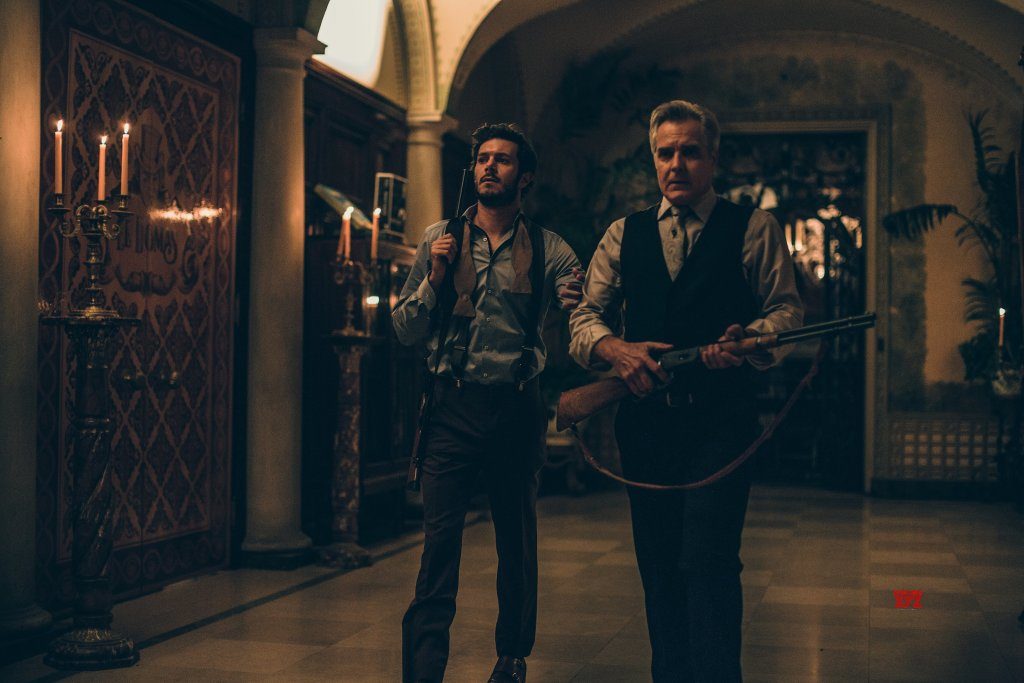
Ready or Not definitely feels like that. It starts with this very old-fashioned atmosphere, with the rich family and the old money trappings. And the, not to get into spoilers, but things get mixed up.
TG: What was the tweet that you sent out recently, Matt? It was like, “People are asking ‘What does Trump cinema look like?'” And it had our poster and the poster for The Hunt side by side. [Editor’s Note: This interview was conducted before The Hunt was pulled from release.] There was something so satisfying about that: “Yes, that is this movie in so many ways. Made for this specific time.” We’re just ahead of that curve. It doesn’t feel preachy. It still feels like a fun movie. Under the surface there’s a lot, thematically, going on in Ready or Not. The big question of the movie, in some ways, “Is extreme wealth in and of itself a deal with the devil?” Is it? I don’t know. We’ll let the movie speak for itself. But I think our answer is pretty clear.
I love that Adam Brody line about rich people. I can’t remember the exact phrasing...
TG: “The rich really are different.” We talked to a few people after Fantasia about the Trump cinema thing, where of course right now there is going to be a heightened disgust for wealth, because of what it’s doing to our country and the world. But also it’s sort of evergreen. Is there any time in history where the wealthy have not exploited everybody else to their own advantage? I can’t think of one.

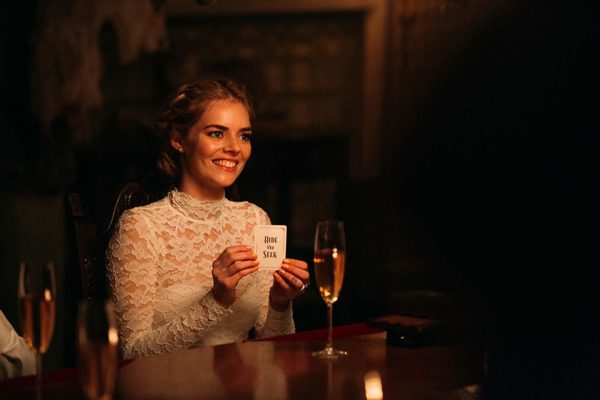

Share this post